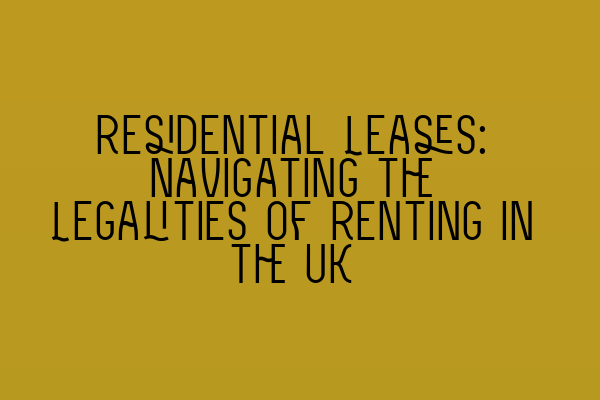Residential Leases: Navigating the Legalities of Renting in the UK
Welcome to the SQE Property Law & Land Law blog! In today’s post, we will explore the essential aspects of residential leases and help you navigate the legalities of renting in the UK. Whether you are a tenant or a landlord, understanding residential leases is crucial to protect your rights and ensure a smooth tenancy. So let’s dive in!
What is a Residential Lease?
A residential lease, also known as a rental agreement or tenancy agreement, is a legally binding contract between a landlord and a tenant. It outlines the terms and conditions of the tenancy, including the rights and responsibilities of both parties. The lease covers crucial aspects such as rent payment, maintenance obligations, and the duration of the tenancy.
It’s important to note that residential leases in the UK can be either fixed-term or periodic. A fixed-term lease has a specific start and end date, while a periodic lease continues on a rolling basis, such as month to month.
Rights and Responsibilities of Tenants
Tenants have certain rights under UK law that protect them from unfair treatment by landlords. It’s essential for tenants to be aware of these rights to ensure a positive renting experience. Here are some key tenant rights:
- Right to a safe and habitable property: Landlords must provide a property that meets basic health and safety standards. If there are any hazards or disrepair issues, tenants have the right to request repairs.
- Right to privacy: Tenants have the right to enjoy the privacy of their rented property. Landlords must provide notice before entering the property, except in emergencies.
- Right to protection against unfair eviction: Tenants cannot be evicted without valid legal reasons. Landlords must follow the proper eviction procedures, giving notice and obtaining a court order if necessary.
In addition to these rights, tenants also have certain responsibilities, such as paying rent on time, keeping the property clean and well-maintained, and notifying the landlord of any issues that need attention.
Rights and Responsibilities of Landlords
While tenants have their rights, landlords also have rights and responsibilities. It’s crucial for landlords to understand their legal obligations to avoid potential disputes or legal challenges. Here are some key landlord rights:
- Right to receive rent: Landlords have the right to timely rent payments as agreed upon in the lease. If tenants fail to pay rent, landlords have the right to pursue legal action.
- Right to enter the property: Landlords have the right to enter the property for necessary inspections, repairs, or other valid reasons. However, they must provide proper notice to the tenant and respect their privacy.
- Right to request a deposit: Landlords can ask for a tenancy deposit from tenants as protection against any damages or unpaid rent. However, they must comply with tenancy deposit protection regulations.
Landlords also have responsibilities, including maintaining the property to a safe and livable standard, addressing repair requests in a timely manner, and providing proper notice before making any changes to the tenancy agreement.
Common Legal Issues in Residential Leases
Residential leases can sometimes give rise to legal challenges or disputes between landlords and tenants. It’s important to be aware of these common issues to mitigate any potential problems. Here are a few:
- Rent increases and rent control regulations
- Disputes over repairs and maintenance responsibilities
- Unlawful eviction or improper notice
- Disagreements over tenancy deposit deductions
- Subletting and unauthorized occupants
Being knowledgeable about these potential legal pitfalls can help both tenants and landlords avoid unnecessary conflicts and seek timely legal advice when necessary.
Professional Legal Assistance for Residential Leases
Residential leasing can be a complex area of law, and seeking professional legal assistance is always advisable. At SQE Property Law & Land Law, our team of qualified solicitors specializes in property law and is ready to help you with your residential lease matters. Whether you require assistance in drafting or reviewing a lease, resolving a tenancy dispute, or understanding your rights and obligations, our experts are here for you.
If you found this article helpful, you may also be interested in reading these related articles:
Updates in UK Property Laws: Key Changes and Implications
Legal challenges in property transactions: A comprehensive guide
Navigating Lease Laws in the UK: Essential Guidelines for Tenants and Landlords
Dominate Property Law Questions: Avoiding Common Pitfalls
Land Law Revision Tips: Ace Your Exam Preparation
For expert advice and assistance with residential leases and other property law matters, contact SQE Property Law & Land Law today!
